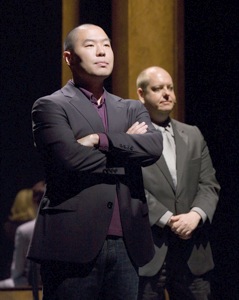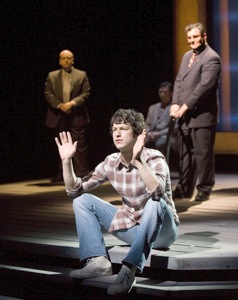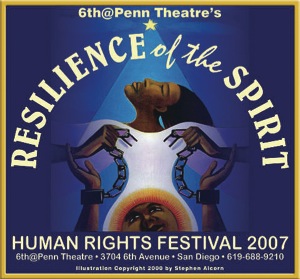-
- Oregon gay rights foes begin signature campaign
- Hawaii Republicans seek mainstream appeal
- Charles Nelson Reilly, Tony-winning comic actor, dies at 76
- U.S. military continues to discharge gay Arab linguists, Congress members seek hearing
- ‘Redneck Riviera’ home to large gay Memorial Day bash
- Ban kept for gay men donating blood
- National News Briefs
- World News Briefs
Arts & Entertainment
Being Asian in America and a celebration of the human spirit
Published Thursday, 31-May-2007 in issue 1014
Yellow Face
Truth is often stranger than, and sometimes the same as, fiction in playwright David Henry Hwang’s world. Best known for his Broadway success M Butterfly (about a French diplomat who falls in love with a Chinese opera diva who turns out to be both male and a spy), Hwang also likes to explore concepts like race, cultural identity and what it means to be an immigrant (or, as he puts it, a perpetual foreigner).
These issues appear in his latest play, Yellow Face, along with considerations of press bias, political persecution and the nature of truth. The world premiere of Yellow Face, which Hwang describes as a “faux autobiography written in a kind of pseudo-documentary format,” plays through July 1 on the Mark Taper Forum stage, directed by Leigh Silverman.
An unusual if not downright odd mélange of fact and fiction wrapped in a piece combining the comedy of mistaken identity, family drama, social commentary and farce, Hwang has written himself in as a director (played by Hoon Lee) casting an Asian character for his new play. This is to be a rewrite of Hwang’s real-life 1993 flop Face Value, written in response to Hwang’s objection to the casting of Jonathan Pryce as a Eurasian pimp in Miss Saigon. When obvious palefale Marcus (Peter Scanavino) auditions, Hwang gives him the part even after the producer asks the simple question: “Does he look Asian to you? If when he takes off his makeup, he’s still white … doesn’t that bother you?”
Though the casting of the non-Asian Marcus was inadvertent (Hwang had spotted him in an “all-Asian” production), he becomes the springboard for reflections about the virtues and drawbacks of blind casting. In his objection to the Pryce casting, Hwang had asked, “If Asians don’t get to play Asians, who do they get to play?” On the other hand, Marcus has become an active Sinophile – even an immigrant activist – and spent stretches of time with the Dong people in China. Does that qualify him to play Asian characters?
Yellow Face careens from Marcus’ story to funny and poignant phone calls and encounters with Hwang’s father (Tzi Ma) to comments about the lack of press objectivity to the blurring of character delineations between Marcus and Hwang (prompting speculation about whether they are both Hwang). Along the way, he tosses in his banker father’s factual run-in with the U.S. government over what were regarded as questionable bank actions. Hwang even inserts the Wen Ho Lee affair (the nuclear scientist accused of downloading nuclear secrets) to demonstrate his point about being a “perpetual foreigner” in the United States.
That’s a lot to put on one theatrical plate, and if the flow seems a little giddy, it’s with good reason. In the hands of a lesser writer, Yellow Face might sink of its own plural plot strands. That it doesn’t – and is in fact consistently engaging – is a tribute to Hwang’s often funny, sometimes poignant, always thought-provoking dialogue.
Still, the production seems a bit clunky. Silverman doesn’t try to stage this; rather, she seats her actors (most of whom play multiple roles) on folding chairs along the back of the thrust, Our Town style. They rise when their turns come. It works, but almost seems more like a reading.
Yellow Face could use a rewrite, and in fact the number of muffed lines on opening night (all excellently recovered, it should be noted) lead to speculation that Hwang is rewriting in production. The piece could also benefit from trimming (the long stretches about Marcus and the Dong people could be shortened, if not deleted entirely, for example) and sharpening.
Silverman has a fine cast. At the top of my list is Ma, who steals the show with his winning interpretation of Hwang’s father and plays a number of other roles (including comic Margaret Cho) with equal panache.
It’s an interesting quirk of chronological convergence that Yellow Face opened last week just as Congress is poised to debate yet another immigration bill in an effort to answer the question of who should and should not be allowed to become an American citizen.
Yellow Face, which goes on to The Public Theater in New York after its run here, is not perfect, but is very much worth seeing both as a contribution to this debate and as engaging theater in its own right.
Yellow Face plays through July 1 at the Mark Taper Forum in Los Angeles. Shows Tuesday through Saturday at 8 p.m.; Sunday at 7:30 p.m.; matinees Saturday and Sunday at 2:30 p.m. For tickets, call 213-628-2772 or visit www.centertheatregroup.org.
6th@Penn’s Human Rights Festival
Divorce. Suicide. Child abuse. Betrayal. People face such experiences every day, and though all are scarred, many survive and go on to illustrate the old adage that “living well is the best revenge.”
Celebrating the human spirit is the theme of the 2007 Resilience of the Spirit Human Rights Festival underway at 6th@Penn Theatre, offering 22 plays reflecting the human condition. The festival plays through June 18.
The Last Class
A professor bids farewell to the semester and to teaching in The Last Class, an autobiographical piece written and directed by local treasure Dr. Marianne McDonald, professor of classics at UCSD and translator of many Greek plays that have seen productions at 6th@Penn.
Jenni Prisk, everyone’s favorite speech coach, does the acting honors wonderfully as the professor who tells her story of being raised in the alcoholic haze of an Irish Catholic family, losing her mother to early institutionalization, a brother to suicide and a daughter to accidental death, along the way making several marriages that can only be described as stunningly inappropriate, and somehow coming through it all to some measure of joy. That list of partners includes an Austrian member of the Nazi SS, a gay Jewish man, an alcoholic Irish lawyer and a Japanese samurai. It’s almost a reverse “Don Giovanni” catalog of whom not to marry.
After all this (and I could have done with a little less about those marriages, or more about their effects on her life), the professor admits that “my passion was stronger than my reason,” but still advises students to “love with a whole heart” and to “be the change you want to see in the world. The rest will follow.”
Good advice, and a fine reminder that the main thing we need to do is keep moving forward.
A Hundred Birds
Two young men, Mike (Greg Wittman) and Dean (Robert Borzych), guard an older man, who sits blindfolded and apparently asleep in a chair. His arm is broken and has been inexpertly bandaged. Mike and Dean await the arrival of Terry (Thomas Hall), the apparent instigator of a plot against the captive’s life.
Gradually it becomes clear that Nicky (Bud Coleman) is the neighborhood child molester who robbed all three men of their innocence by repeated sexual abuse when they were kids. Now they want revenge. Can they kill him? Should they?
Ira Bateman-Gold’s A Hundred Birds plays in repertory through June 18 as part of the Resilience of the Spirit Human Rights Festival at the 6th@Penn Theatre.
Terry arrives with enough determination and rage to finish the job, but Mike shows some reluctance. The ensuing dialogue reveals the devastating effects and illustrates the differing responses to the abuse they suffered. Mike, who has never found love, still feels strangely attached to Nicky. Dean feels himself responsible for having acceded to Nicky’s suggestions. “He asked me and I said OK,” he says. Terry recalls with a revulsion that has turned to rage that “he used to call me ‘pretty girl.’”
Hall’s Terry is exactly right – angry, single-minded, ready to rid the world of this blight. Wittman and Borzych are a bit less successful at portraying their ambiguous feelings about the plan.
A Hundred Birds (the image comes from Terry’s description of gooney birds, gorgeous in flight, but so awkward on landing that they “go bippity-bop, right on their heads”) offers no simple solutions or ways to make it better for these wounded birds, but it forces the audience to ponder this terrible social problem.
6th@Penn Theatre’s Resilience of the Spirit Human Rights Festival 2007 continues with 22 plays in repertory through June 18. For play schedule and tickets, visit www.resilienceofthespirit.com.
|
|
Copyright © 2003-2025 Uptown Publications




